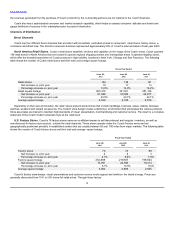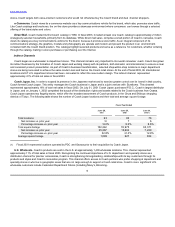Coach 2002 Annual Report Download - page 17
Download and view the complete annual report
Please find page 17 of the 2002 Coach annual report below. You can navigate through the pages in the report by either clicking on the pages listed below, or by using the keyword search tool below to find specific information within the annual report.
Table of Contents
changes in local economic conditions. These factors, among others, could influence Coach’s ability to sell products successfully in
international markets. Coach generally purchases products from international manufacturers in U.S. dollars and sells these products in the
U.S. and to its international wholesale customers in U.S. dollars. However, Coach’s international wholesale customers sell Coach products
in the relevant local currencies, and currency exchange rate fluctuations could adversely affect the retail prices of the products and result in
decreased international consumer demand.
Coach’s trademark and other proprietary rights could potentially conflict with the rights of others and it may be inhibited from
selling some of its products. If Coach is unable to protect its trademarks and other proprietary rights, others may sell imitation
brand products.
Coach believes that its registered and common law trademarks and design patents are important to its ability to create and sustain
demand for Coach products. Coach cannot assure you that it will not encounter trademark, patent or trade dress disputes in the future as it
expands its product line and the geographic scope of its marketing. Coach also cannot assure that the actions taken by it to establish and
protect its trademarks and other proprietary rights will be adequate to prevent imitation of its products or infringement of its trademarks and
proprietary rights by others. The laws of some foreign countries may not protect proprietary rights to the same extent as do the laws of the
U.S. and it may be more difficult for Coach to successfully challenge the use of its proprietary rights by other parties in these countries.
Provisions in Coach’s charter and bylaws, Maryland law or its “poison pill” may delay or prevent an acquisition of Coach by a
third party.
Coach’s charter and bylaws and Maryland law contain provisions that could make it harder for a third party to acquire Coach without the
consent of Coach’s Board of Directors. Coach’s charter permits its Board of Directors, without stockholder approval, to amend the charter to
increase or decrease the aggregate number of shares of stock or the number of shares of stock of any class or series that Coach has the
authority to issue. In addition, Coach’s Board of Directors may classify or reclassify any unissued shares of common stock or preferred stock
and may set the preferences, rights and other terms of the classified or reclassified shares. Although Coach’s Board of Directors has no
intention to do so at the present time, it could establish a series of preferred stock that could have the effect of delaying, deferring or preventing
a transaction or a change in control that might involve a premium price for Coach’s common stock or otherwise be in the best interest of
Coach’s stockholders.
On May 3, 2001 Coach declared a “poison pill” dividend distribution of rights to buy additional common stock to the holder of each
outstanding share of Coach’s common stock. Subject to limited exceptions, these rights may be exercised if a person or group intentionally
acquires 10% or more of Coach’s common stock or announces a tender offer for 10% or more of the common stock on terms not approved by
the Coach Board of Directors. In this event, each right would entitle the holder of each share of Coach’s common stock to buy one additional
common share of Coach stock at an exercise price far below the then-current market price. Subject to certain exceptions, Coach’s Board of
Directors will be entitled to redeem the rights at $0.001 per right at any time before the close of business on the tenth day following either the
public announcement that, or the date on which a majority of Coach’s Board of Directors becomes aware that, a person has acquired 10% or
more of the outstanding common stock. We are currently aware of one institutional shareholder whose common stock holdings exceed the
10% threshold established by the rights plan. This holder has been given permission to increase its ownership in the Company to a
maximum of 15%, subject to certain exceptions, before triggering the provision of the rights plan.
Coach’s bylaws can only be amended by Coach’s Board of Directors. Coach’s bylaws also provide that nominations of persons for
election to Coach’s Board of Directors and the proposal of business to be considered at a stockholders meeting may be made only in the
notice of the meeting, by Coach’s Board of Directors or by a stockholder who is entitled to vote at the meeting and has complied with the
advance notice procedures of Coach’s bylaws. Also, under Maryland law, business combinations, including issuances of equity securities,
between Coach and any person who beneficially owns 10% or more of Coach’s common stock or an affiliate of such person are prohibited for
a five-year period unless exempted in accordance with the statute.
15
























